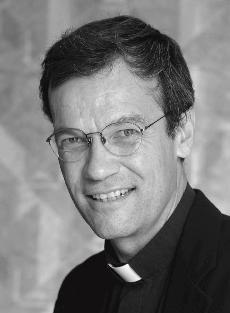
|
| presents
|
M I C H A E L M
A H E R, S. J.
Galileo and the Catholic
Church
A Reconsideration
|

|
|
On January 7, 1610, Galileo
Galilei pointed his newly improved 20x
telescope to the skies and discovered
celestial objects that had never been seen
before, among them four scattered points
of light near Jupiter. Observing their
motion over the course of a week, Galileo
found these points of light to be always
near Jupiter, but in different relative
positions, and seemingly disappearing
behind Jupiter on one side and reappearing
on the other, Galileo concluded that these
lights were actually satellites orbiting
Jupiter. They were the first celestial
objects found to orbit a planet other than
the earth, and these observations took a
serious chip out of the Ptolemaic, or
geocentric, model of the universe. Other
discoveries followed that reinforced the
Copernican, or heliocentric, model, such
as Galileo's observation of the phases of
Venus. Galileo's mounting evidence and
promotion of a theory at odds with the
position of the Catholic Church resulted,
on February 23, 1616, in the
Inquisition declaring heliocentrism to be
"formally heretical." The Pope, according
to the Inquisition file, "directed the
Lord Cardinal Bellarmine to summon before
him the said Galileo and admonish him to
abandon the said opinion; and, in the case
of his refusal to obey, the Commissary of
the Holy Office is to enjoin him ... to
abstain altogether from teaching or
defending this opinion and even from
discussing it." Galileo continued to
advance his theory, and in 1632 he
published his immensely popular Dialogue
Concerning the Two Chief World Systems.
The Roman Inquisition tried Galileo in
1633, found him "vehemently suspect of
heresy," and sentenced him to indefinite
imprisonment. Galileo was kept under house
arrest until his death in 1642.
Father Maher writes,
When discussions occur
dealing with religion—any
conversations in which knowledge is
used ascertained by faith or
revelation—and
science, the rebuttal usually comes in
terms of either the Spanish
Inquisition or the Galileo trial.
Leaving aside for now the Spanish
Inquisition, this discussion will look
at the Galileo case, particularly as
how it was viewed through the lens of
the “conflict thesis” a theoretical
framework developed in the last
quarter of the 19th century that saw
religion and science as constantly at
“war.” This discussion will examine
the Galileo case, particularly looking
at some of the complexities of the
evidence and their historical setting,
which involved Galileo and Cardinal
Robert Bellarmine, S.J. The purpose of
this talk and subsequent discussion
will be to foster an understanding of
the Galileo case that sees it as more
complex than the simplistic
distillations presented for popular
consumption.
|
|
Father Michael
Maher, S.J., is associate
professor of history at Marquette
University in Milwaukee and
pastoral minister to the Wells
Street Residence Hall there. His
academic experiences have included
chair of the Department of History
at Gonzaga University in Spokane
and dean of the
Gonzaga-in-Florence program;
assistant professor of history at
St. Louis University; and adjunct
assistant professor of history at
the University of Minnesota.
Father Maher was born in
Milwaukee. He entered
the Society of Jesus, the Jesuits,
in 1975. He received his
undergraduate degree in philosophy
from St. Louis University, and has
two different master’s degrees in
theology from the Jesuit School of
Theology in Berkeley. He has a PhD
in history from the University of
Minnesota and held a post doctoral
position at the Vatican in
paleography.
|

|
|
|
FREE and
ONLINE
Tuesday, February 23, 2021
5:30-7:00 pm CDT
|
|
|
Sign
in 5:00-5:30 pm for informal cigar
and cocktail chatter. The event will
be called to order at
5:30.
There
will be a Q&A session following the
lecture. Audience participation is
invited. The event will conclude at
7 pm. An optional cocktail party
and discussion will continue after the
event.

After
you register for the event, look for Order
Confirmation email from Eventbrite. Scroll to the bottom of the
message for a link to the video
conference, and other instructions. From the Order Confirmation
email you can also save the event to
your online calendar and later join the video
conference from the link automatically
provided in the calendar entry.
|
|
|
|
About
the
Cigar Society of Chicago
ONE OF THE OLDEST AND
greatest traditions of the city clubs of
Chicago is the discussion of intellectual,
social, legal, artistic, historical,
scientific, musical, theatrical, and
philosophical issues in the company of
educated, bright, and appropriately
provocative individuals, all under the
beneficent influence of substantial
amounts of tobacco and spirits. The
Cigar Society of Chicago
embraces this tradition and extends it
with its Informal Smokers, University
Series lectures, and Cigar
Society Dinners, in which cigars,
and from time to time pipes and
cigarettes, appear as an important
component of our version of the classical
symposium. To be included in the
Cigar Society's mailing list, write to the
secretary at
curtis.tuckey@logicophilosophicus.org
|
|
|